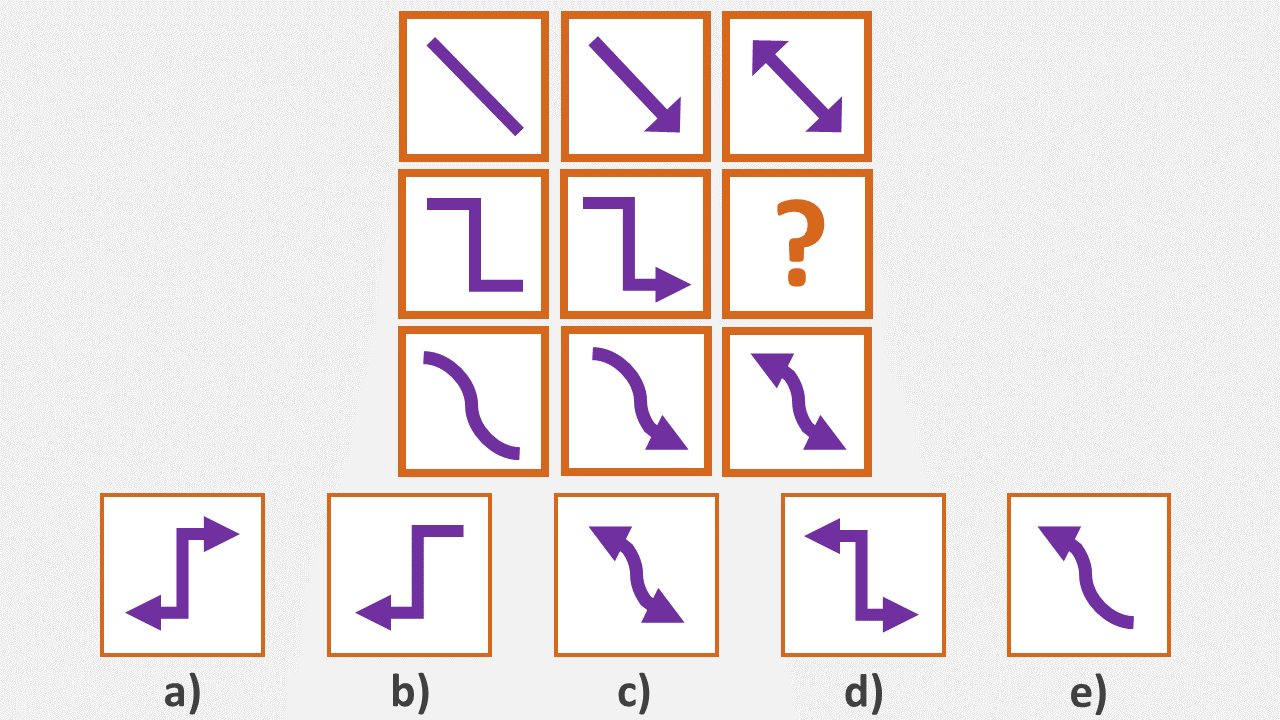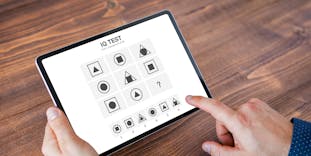The 8 Best IQ Tests in 2024
Updated January 22, 2024
1. Real IQ test
The Real IQ test, employs a testing methodology focused on precision. Inspired by the recommendations of prominent psychologist Jordan Peterson, this test comprises 100 diverse abstract questions.
A distinctive feature is its scoring system, arranged in rank order, leading to a notable correlation of 0.9. This online IQ test distinguishes itself through its well-founded research foundation.
Consensus holds that the test's results align with traditional supervised IQ tests with an impressive accuracy rate of within 1.8%, showcasing a remarkable level of precision compared to earlier iterations of online IQ assessments.
2. Mensa
With national societies in more than 90 countries, it is easy to find a testing center that you can attend for an opportunity to get in round the hallowed table at Mensa.
In the US, you can choose to take part in a group proctored testing session, or take a private test – either way, these tests have a financial cost, and you will have to score in the top 2% to be offered membership.
The downside to taking the Mensa test is that if you do not hit the lofty heights of that 2%, you don’t actually get to find out your score, which can be disappointing.
3. QuickIQTest
This is an online IQ test that you can get an instant result from, although you will need to pay to receive it.
In this test, you will be asked to complete 22 questions, with a 25-minute time limit. It is browser-based and simple to complete, which is good – but the results are behind a paywall.
However, if you are willing to pay the one-off fee, not only will you get your score, but you will also get a printable certificate and a full PDF ‘Intellectual Evaluation and Analysis Report’.
4. IQTest.com
If you’re looking for the best free IQ test, this could be a good option to try. This is a free general IQ test, which includes your score details provided for free. You can pay for a report that describes your performance in 13 key areas of intelligence, which can help reveal key cognitive strengths and weaknesses.
According to the site, the test has been created by PhD holders and is statistically sound, with more than 19 million tests taken so far.
For those who want to improve, you can also take advantage of IQTuneUps, a program designed to improve your cognitive abilities for a cost.
5. International High IQ Society
As an alternative to Mensa, the International High IQ Society offers membership to individuals who have scored in the top 5% of their IQ test.
If you want to join, you will need to take the Culture Fair Intelligence Test, which consists of 25 questions that need to be answered in 30 minutes. The test is designated ‘Culture Fair’ because it does not involve language – the questions are a series of matrices that get increasingly more difficult as you move through the test.
Upon completion, you’ll get an official certificate with your score. This test is not free, but you can find free IQ test samples online.
Visit International High IQ Society
6. Brain Metric
If you’re seeking the best free IQ test that is hassle-free too, this is a worthwhile option to consider. This is a really simple, straightforward and importantly free IQ test – you don’t even need to put your email address in to get the results.
There are 20 multiple-choice questions, with no time limit. This means that there is a lot less pressure on the test taker, and you don’t need to worry about sharing your personal details (and the risk of overwhelming spam emails, for example).
7. Free-IQTest.net
The free IQ test on this site is another one that is simple and easy – although the proliferation of adverts might be off-putting.
You’ll only need to share your date of birth to get started, then you will get 20 or so questions for the test.
In addition to the free online IQ test, the site also offers many articles and further information about IQ tests, and you’ll also be able to take some practice questions so that you know what to expect.
8. MyIQTested.com
This IQ test is not timed, and you will only need to share your date of birth to get started – the scores are normed based on your age.
More than one million people have taken the test, according to the website, and aside from the test itself there are plenty of resources about what IQ means and about testing in general.
Once you have completed the test, you can access a report that focuses on your perception, memory, creativity, logic, comprehension and other facets of intelligence.
9. IQ Exam
Created by the McGill University Research Team, this IQ test only has 30 questions and no time limit. This is a free IQ test online that evaluates your performance based on non-verbal multiple-choice questions using matrices, and you will receive your score and a basic report for free.
You can pay an extra fee for reports that are more detailed and include a plan you can refer to for improvement.
What Is an IQ Test?
An IQ test is designed to measure the mental ability of an individual, based on the results of large numbers of the population, from all sorts of social and economic backgrounds.
IQ tests have a long history and there are many tests available, both free and paid, that can be used to compare the Intelligence Quotient of children and adults amongst their peers.
You might take an IQ test if you are looking for membership in elite clubs like Mensa, or to evaluate your own mental acuity.
You might have IQ testing as part of your education (or that of your children) for entry to gifted and talented programs.
Some jobs require IQ testing as part of the recruitment process, while others use IQ tests to help create learning and development pathways for employees.
The History of the IQ Test
The earliest notion of an intelligence test came in 1884 with Sir Francis Galton.
As a scientist, he was interested in creating a standardized test that would be helpful in recognizing what was considered to be intelligence – and came up with a test that included a vision and hearing test, as well as measuring reaction times to different stimuli.
In 1890, James McKeen Cattell took this idea forward with the idea of looking at perceptual speed, with questions that were based on how quickly and accurately the individual could perceive and react.
While this was a more robust test than Galton created, it was widely understood that the results were not a predictor of academic achievement and therefore not great as a measure of intelligence.
The first modern-day intelligence test – that we would recognize as an IQ test – was not a scientific endeavor. Instead, Alfred Binet wanted to create a test that would identify which children were struggling to keep up in the newly compulsory school system.
Questions in this test, which was first used in 1905, were about knowledge as well as simple reasoning, and the results placed the children against their peers in terms of mental development.
In 1912, William Stern took this test and improved it, basing the results on the German word Intelligenzquotient.
As a psychologist, Stern wanted to make the recording of results more accurate (and a quotient, to match the German phrasing) by dividing the mental age (demonstrated by results) by the real age of the child.
This meant that a child who was 10 and had a mental age of 10 would have a score of 1, while a child of 10 who had a mental age of 12 would have a score of 1.2.
Lewis Terman is credited with making the score larger – by multiplying that original sum (mental age / real age) by 100; so that 10-year-old with a mental age of 12 would have an IQ score of 120.
The only issue with these tests is that they are skewed to only work for children where mental acuity is still developing – calculating scores for adults was not possible until David Wechsler solved that problem, using normal distribution and establishing the IQ average as 100.
What Does an IQ Test Actually Test?
There are various schools of thought about what intelligence actually is, including a relatively new idea that emotional intelligence is actually more important in the day-to-day life of an individual than IQ is.
However, Howard Gardner has stated that there are eight types of human intelligence, and that people can have high scores in one or more – and this can be linked to success in specific areas of life and in their careers, too.
Gardner, a psychologist and a professor at Harvard University, stated these types are:
- Spatial Intelligence
- Body-Kinesthetic Intelligence
- Musical Intelligence
- Linguistic Intelligence
- Logical-Mathematical Intelligence
- Interpersonal Intelligence
- Intrapersonal Intelligence
- Naturalistic Intelligence
With this in mind, most IQ tests will look at the following:
- Knowledge
- Working memory
- Quantitative reasoning
- Visual-spatial processing
- Fluid reasoning
- Processing speed
- Verbal comprehension
The Classification of IQ Scores
Different IQ tests, although they may be standardized individually, will often not match other tests in scores and results, but there are some basic classifications that are used.
| Score | Description |
|---|---|
| 130+ | Very Superior |
| 120 to 129 | Superior |
| 110 to 119 | High Average |
| 90 to 109 | Average |
| 80 to 89 | Low Average |
| 70 to 79 | Borderline |
| 69 and below | Intellectual Disability |
How to Take a IQ Test
There are several different types of IQ tests. Some of these can be taken as an IQ test online, and many are free.
If you are taking an IQ test online, you’ll need to use a browser – the tests are usually basic and browser-based, so you won’t need to download anything.
Tests are usually timed, lasting less than half an hour in most cases, and can include 20 to 30 questions.
The questions themselves are usually multiple-choice, and to answer the questions you’ll need to click on the answer that you think is correct. Scores are generally based on the number of questions that you have answered correctly, and in the tests that are not timed, how quickly you complete the assessment.
If you are looking for admission to Mensa or another high IQ society, you might be required to take a specifically proctored test at a test center – these are also taken on a computer and completed in the same way.
Example Questions on an IQ Test
1. What number comes next in the below sequence?
1, 4, 2, 5, 3, 6, ?
a) 4
b) 3
c) 5
d) 2
2. What shape completes the pattern?


3. The word ‘clutch’ can be made by changing just one letter in the word ‘hutch’.
a) True
b) False
Why Take IQ Tests?
While intelligence is often used as a benchmark for job suitability, IQ tests are not regularly used as part of the recruitment process – but you might have other opportunities to take an IQ test in your lifetime.
For many, entry to Mensa International might be a reason to check IQ scores. Established in 1946 in Oxford, England, Mensa was the brainchild of Roland Berrill and Lancelot Lionel Ware.
With the lofty ideals of being free from politics, race and religion, the established mission of Mensa is:
- To identify and foster human intelligence for the benefit of humanity
- To encourage research into the nature, characteristics and uses of intelligence
- To provide a stimulating intellectual and social environment for its members
There are currently around 145,000 Mensans in about 90 countries, and the only qualification for entry is to score in the highest 2% of test takers in the Mensa IQ test.
Schools often use IQ tests to evaluate students, ensuring that they are reaching their potential and not falling behind – a nod to one of the earlier reasons for creating an intelligence measuring test.
These are also used to decide whether a student should enter a gifted and talented program or access a specialist school.
Of course, most people take IQ tests just to see what they score, whether that is to provide a baseline for improvement, or for bragging rights amongst friends. The limited application of the IQ test for adults doesn’t reduce the interesting results that these tests can bring.
How to Prepare for an IQ Test
Step 1. Practice
As with other tests, one of the best things that you can do when you are preparing is to practice. You can use paid tests or find an IQ test free online. With so many free tests available, it is easy to find different ones to practice on – and this has great benefits for your overall performance.
Practice tests help you to get used to the test environment and how to take a IQ test – how to answer the questions, how the tests are structured and what to expect in a browser-based test.
They also get you used to the way the questions in IQ tests are asked, whether you are answering questions on number series, on matrices or even on verbal reasoning.
Step 2. Brain Training
In addition to taking an IQ test free online, there are more than a handful of brain training games available, and many are specifically designed for use on smartphones.
This means that you can be playing a game on your mobile phone while waiting for an appointment and improving your intelligence – using skills like working memory, logical thinking and inductive reasoning.
You can try Sudoku, crosswords and other games too – but the brain training game apps are fun and exciting, which makes it more likely that you will practice.
Step 3. Personal Preparation
An important part of the best IQ test preparation is to practice self-care. Self-care is important in the run-up to any test, and an IQ test is no different.
You will want to fuel your mind in the right way, which means that you will want to ensure that you eat well, stay hydrated and get enough sleep.
Eat nutritionally balanced meals, drink plenty of water and aim for between six to eight hours of sleep a night – this will keep your brain working as efficiently as possible.
An IQ test, or Intelligence Quotient test, is a standardized assessment designed to measure a person's cognitive abilities and intellectual potential.
It aims to quantify intelligence through a series of tasks and questions that evaluate various aspects like logical reasoning, problem-solving, memory, and mathematical skills.
The score is often normalized so that the average IQ is 100, with a standard deviation, usually of 15 points.
An IQ test typically includes a range of questions that evaluate different cognitive skills.
These can involve verbal comprehension, mathematical reasoning, spatial relations, and logical reasoning. Some tests might include pattern recognition, analogies, classification tasks, and numerical sequences.
Different IQ tests can have a focus on various kinds of questions, but they generally aim to provide a comprehensive assessment of intellectual capability.
The length of an IQ test can vary depending on the specific test and its complexity. Generally speaking, most standardized IQ tests take between 60 to 120 minutes to complete. Some online IQ tests claim to offer quicker assessments, but these may not be as reliable or as in-depth as the more comprehensive versions.
The cost of an IQ test can vary widely depending on the test provider, location, and whether a professional is administering it.
Tests administered by psychologists can cost upwards of $200, while online tests may be free or have a nominal fee. It's important to consider the reliability and reputation of the test when evaluating cost.
The concept of an IQ test was developed in the early 20th century, with significant contributions from psychologists such as Alfred Binet and Theodore Simon, who created the Binet-Simon test in 1905.
This test was later adapted and refined by others, including Lewis Terman, who developed the Stanford-Binet test that became widely used in the United States.
Determining the best IQ test is subjective and depends on what you're looking to measure. The Stanford-Binet and the Wechsler Adult Intelligence Scale (WAIS) are among the most widely recognized and respected IQ tests, often used for educational and clinical assessments.
Both have undergone rigorous validation processes and are commonly administered by trained professionals, making them reliable indicators of cognitive ability.
Online IQ tests vary significantly in their accuracy and reliability. While some may offer a rough estimate of your intellectual abilities, they often lack the scientific rigor of professionally administered tests.
They may not be normed or validated against a large population, and they might not cover all aspects of intelligence.
For a more accurate and comprehensive understanding of your cognitive abilities, it's best to take a professionally administered IQ test.
Qualified professionals like psychologists, educational diagnosticians, and neuropsychologists usually administer IQ tests.
These individuals have undergone specialized training to ensure that the test is administered consistently and scored accurately.
In educational settings, certified school psychologists may also administer IQ tests.
IQ tests are generally considered reliable for children aged 6 and older, and the reliability tends to increase with age.
Some tests, like the Stanford-Binet, can be used for children as young as two years old. However, IQ scores for very young children are often less stable and should be interpreted cautiously.
There are numerous IQ tests, each designed with specific populations, age groups, or cognitive facets in mind.
Among the most widely recognized are the Stanford-Binet Intelligence Scales, the Wechsler Adult Intelligence Scale (WAIS), and the Wechsler Intelligence Scale for Children (WISC).
Many other specialized IQ tests also exist, including those designed for non-English speakers or people with specific disabilities.
IQ tests aim to measure general cognitive ability or 'intelligence', which includes skills like problem-solving, logical reasoning, mathematical ability, spatial relations, and verbal comprehension.
They do not measure other forms of intelligence like emotional or creative intelligence and are not a comprehensive measure of a person's abilities or potential.
IQ test scores are generally standardized to have an average score of 100 and a standard deviation, usually around 15 points.
After administering the test, the raw scores are calculated and converted into a scaled score based on a normative sample.
This scaled score is the IQ score. The higher the score, the higher the individual's measured cognitive abilities compared to the general population.
Final Thoughts
IQ tests can have official uses – for example, getting entry to Mensa or for children looking to join a gifted and talented program – but for most of us, they are a fun way to challenge ourselves and compare our intelligence amongst friends and colleagues.
The more you know about the IQ tests, the better you will be able to perform. Finding a practice IQ test free online is a good way to get used to them. You will feel more familiar with the way these tests are administered and structured, and therefore be able to concentrate on getting the answers right, quickly and effectively.





